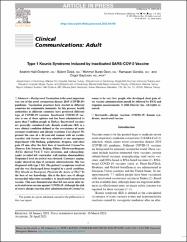Type 1 Kounis Syndrome Induced by Inactivated SARS-COV-2 Vaccine
Citation
I.H. Özdemir et al., TYPE 1 KOUNIS SYNDROME INDUCED BY INACTIVATED SARS-COV-2 VACCINE, Journal of Emergency Medicine, https://doi.org/10.1016/j.jemermed.2021.04.018Abstract
Background Vaccination is the most important way out of the novel coronavirus disease 2019 (COVID-19) pandemic. Vaccination practices have started in different countries for community immunity. In this process, health authorities in different countries have preferred different type of COVID-19 vaccines. Inactivated COVID-19 vac- cine is one of these options and has been administered to more than 7 million people in Turkey. Inactivated vaccines are generally considered safe. Kounis syndrome (KS) is a rare clinical condition defined as the co-existence of acute coronary syndromes and allergic reactions. Case Report We present the case of a 41-year-old woman with no cardio- vascular risk factors who was admitted at our emergency department with flushing, palpitation, dyspnea, and chest pain 15 min after the first dose of inactivated CoronaVac (Sinovac Life Sciences, Beijing, China). Electrocardiogram (ECG) showed V4-6 T wave inversion, and echocardiog- raphy revealed left ventricular wall motion abnormalities. Troponin-I level on arrival was elevated. Coronary angiog- raphy showed no sign of coronary atherosclerosis. She was diagnosed with type 1 KS. The patient’s symptoms resolved and she was discharged from hospital in a good condition. Why Should an Emergency Physician Be Aware of This? To the best of our knowledge, this is the first case of allergic myocardial infarction secondary to inactivated coronavirus vaccine. This case demonstrates that KS can occur after in- activated virus vaccine against COVID-19. Although the risk of severe allergic reaction after administration of CoronaVac
The patient has given informed consent to the publication of this case report. seems to be very low, people who developed chest pain af- ter vaccine administration should be followed by ECG and troponin measurements.


















